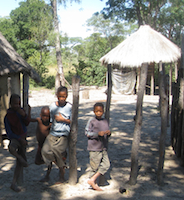
Inter Press Service | 15 May 2010
By Servaas van den Bosch
BORICHA, Namibia, May 15, 2010 (IPS) - Pensioner Makena Makanga slowly savours a piece of manketti fruit unaware that the tree it came from will soon be chopped down and mulched along with the rest of her forest to make way for a massive agribusiness project.
Makanga lives in one of a gathering of clay huts that finds itself in the middle of what is to become the Katondo Farm Project. Boricha's scenic woodland, dotted with old manketti trees, is a biodiversity hotspot, home to a great variety of valuable plants and an important migratory route for animals; but a 10,000 hectare farm is planned for the site in the Bwabwata National Park, four kilometres from the Angolan border.
Makanga doesn’t know exactly how old she is, but she has gathered food around the forest all her life.
"Interviews with the Khwe in the surrounding areas indicate that most walk many kilometres to harvest veldt foods from the area around Boricha," says Lucy Kemp of the Round River Project that charts the natural resources available to the Khwe San tribe in Bwabwata.
According to environmental consultant to the project, Norman van Zyl from Enviro Dynamics, "several hundred families" at least depend on the forest for their livelihoods.
But if it is up to agricultural group Demeter International and its Namibian black economic empowerment (BEE) partner Labour Investment Holdings (LIH), the land will be cleared for farming, with ploughing scheduled for October.
Rival land claims
LIH obtained a 25-year leasehold from Hambukushu Chief Mbambo across the river in exchange for a 15 percent stake in the 20 million dollar project for the Traditional Authority. The BEE group argues the site is the only open land available, while Demeter maintains "no people live on the land".
But the Khwe - who don’t recognise Mbambo’s authority over the park - say it’s a ploy of the Hambukushu to strengthen their hold over the disputed land.
Already the park’s boundary is being pushed eastwards by invading livestock and farming.
"(Mbambo) is not of my tribe, he doesn’t even speak our language. He wants to give our land to other people," says community member Andrew Ndala. Efforts of the marginalised Khwe to get their own Traditional Authority recognised have proved futile so far.
"There’s no reason why the Khwe shouldn’t have one. It’s their constitutional right, " says Ben Begbie-Clench, coordinator of the Working Group of Indigenous Minorities in Africa (WIMSA). "Instead, the process has been dragging for over a decade, which stands in sharp contrast to the fast pace at which the Katondo Farm Project is being approved." Questions from Kyaramacan, the organisation that speaks for the 5,000 residents of the park, during a presentation to the community Feb. 4 show that Demeter and LIH had up to that point ignored the Khwe who would be displaced or lose access to their principal food source.
"When the site was identified, who from the community went with to identify it?" the residents asked. "The proposed area is where most of our valuable plants occur, plants which are good for people. If the field is developed, where are our people going to survive?"
Proponents defend project
Contacted for comment in South Africa, Demeter manager Clay Taber said the benefits from the project for the community would be "a darn good deal better then harvesting plants".
LIH chief executive officer Cleophas Mutjavikua claimed environmental and human rights groups were behind Khwe resistance to the project. "They are talking about harvesting devil’s claw and all that nonsense, but meanwhile the people there depend on government hand-outs."
According to Mutjavikua, it is up to chief Mbambo to share his 15 percent stake with the Khwe. "We don’t want to get involved in tribal feuds."
A planned fund sponsoring "tailor-made" development programmes for the Khwe hasn’t left the drawing board and will only become real after the project turns a profit.
"We have decided not to allow the farm," says Ndala.
"Earlier the Hambukushu and the government brought a prison farm into the park. We were promised many jobs, but nothing happened. Now again the developers talk of jobs as machine operators or drivers. But most of us have no qualifications or driving licenses. We don’t believe these promises."
Environmental impacts
Meanwhile, civil society and environmental experts are flabbergasted as to why large-scale farming is even being considered in the park.
"Allowing a minority group to be dispossessed of their land in favour of a foreign group that wants to start agriculture in a national park sets a serious policy precedent," comments independent environmental researcher John Mendelsohn, accusing the authorities of short-sightedness. "In Botswana, such a development would be considered ludicrous."
Demeter claims that: "The 10,000 hectare project will not destroy the wilderness character or the sense of place," seems laughable in the light of the damning conclusions of the scoping report.
"The project will impact on a pristine protected ecological system. The potential impacts will be in terms of loss of pristine and protected habitat and increased human intervention in the relatively undisturbed eco-system," write the consultants.
"All of this will be razed to the ground," said Friedrich Alpers of the conservation group IRDNC - Integrated Rural Development and Nature Conservation - that promotes livelihoods for the park residents, gesturing through the car window at kilometres of precious woodland. "The developers never even left the tarred road to consider the area they are destroying."
Other potential impacts pollution of the Okavango river, obliteration of wildlife patterns, the integrity of the Kavango-Zambezi transfrontier park and loss of organic certification for the Khwe’s natural products.
Kyaramacan has filed a counter claim with the Ministry of Environment and Tourism asking for permission to develop 7,700 hectares around Boricha into a low-impact "community conservation farm" that grows indigenous plants for food and medicine.
*The first of a pair of articles examining issues surrounding the Katondo Farm Project.











